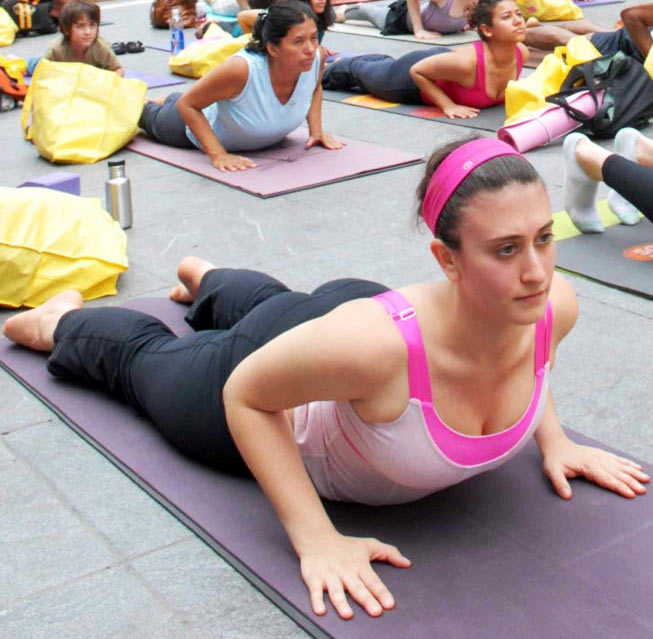Photographs: Creative Commons/U.S. Department of Agriculture
Consuming beneficial bacteria through foods such as yogurt or taking probiotic supplements may reduce blood pressure, a new research has found.
Researchers found that people in randomised, controlled studies who regularly ate foods containing large amounts of live bacteria or who took probiotic supplements reduced their blood pressure during the studies more than the control groups.
People who took probiotics reduced their systolic blood pressure (the top number in a reading) by an average of 3.56 millimetres of mercury, and their diastolic blood pressure (the second number) by an average of 2.38 millimetres of mercury, more than the study participants who were not consuming probiotics.
"The small collection of studies we looked at suggest regular consumption of probiotics can be part of a healthy lifestyle to help reduce high blood pressure," said study author Jing Sun, a senior lecturer in biostatistics at the Griffith University School of Medicine in Queensland, Australia.
"They can also help maintain healthy blood-pressure levels," Sun said.
Researchers evaluated data collected from nine previously published, high-quality studies that examined the effect of probiotics in a total of 543 adults who had normal or high blood pressure, 'Live Science' reported.
Most of the trials were small and involved people who got healthy bacteria from eating foods such as yogurt, fermented dairy drinks or cheese. One study involved people who took a probiotic supplement, given in a capsule form.
The analysis did not look at whether getting probiotics from food was better at reducing blood pressure than getting good bacteria from supplements.
The data showed that people needed to consume probiotics for at least eight weeks to see improvements in blood pressure.
The findings are published in the journal Hypertension.
Source: PTI
Note: All pictures used only for representational purposes
Please click NEXT to continue reading
Yoga helps in dealing with social anxiety disorders
Photographs: Paresh Gandhi/Rediff.com
A new study claims that yoga and other exercises, which have relaxing effect on our bodies, can help people with social anxiety disorders look at the world positively.
Adam Heenan, a PhD from Queen’s University found that relaxation activities literally change the way people perceive the world, altering their perception so that they view the environment in a less threatening, less negative way.
For people with mood and anxiety disorders, this is an important breakthrough.
For the research, Heenan used point-light displays, a depiction of a human that is comprised of a series of dots representing the major joints. Human point-light displays are depth-ambiguous and because of this, an observer looking at the display could see it as either facing towards them or facing away.
Researchers have found people who are socially anxious perceive these figures as facing towards them more often. Heenan said that they found that people who either walked or jogged on a treadmill for 10 minutes perceived these ambiguous figures as facing towards them (the observer) less often than those who simply stood on the treadmill.
The same was true when people performed progressive muscle relaxation. This was important because anxious people display a bias to focus on more threatening things in their environment. The research is published in PLOS one.
Source: ANI
Please click NEXT to continue reading
Interacting with 'strangers' impacts one positively
Photographs: A still from Anand
A new study has claimed talking to complete strangers actually gives people more positive experience. University of Chicago Booth School of Business Professor Nicholas Epley said that connecting with strangers on a train may not bring the same long-term benefits as connecting with friends, but commuters on a train into downtown Chicago reported a significantly more positive commute when they connected with a stranger than when they sat in solitude.
Epley and co-author of the study Juliana Schroder found that participants in the experiments not only underestimated others' interest in connecting, but also reported positive experiences by both being spoken to and to speaking with a stranger.
Though participants reported greater well-being when they engaged with strangers, they predicted precisely the opposite pattern of experiences, which demonstrated a profound misunderstanding of the psychological consequences of social engagement. Participants were commuter train and public bus riders who were asked to talk to a stranger, to sit in solitude, or to do whatever they normally would do, then fill out a survey to measure the actual consequences of distant social engagement versus isolation, and the participants in the connection condition reported having the most positive experience out of all three of our experimental conditions, said Epley.
The study is published in The Journal of Experimental Psychology: General.
Source: ANI




Comment
article